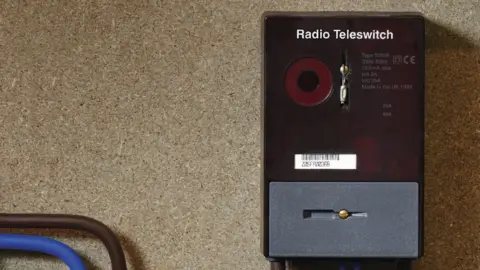BBC business reporter
 Smart Energy GB
Smart Energy GBHundreds of thousands of households who may have been left without hot water and heating at the end of June will not immediately have their old meters switched off, the government has said.
There will instead be a “cautious and targeted phase out” of Radio Teleswitch Service (RTS) meters, it said.
The switch-off will begin on a smaller scale, and affected homes and businesses will be contacted by suppliers “well ahead of time”, the energy department said.
Fuel poverty campaigners said the switch-off process had been “doomed to failure” after it became clear that the 30 June deadline was “simply unachievable”.
As of last month, about 314,000 households were using the RTS meters, and having them switched off could have meant they lost heating – or had it stuck on constantly.
About a third of those households are in Scotland.
The meters use a longwave radio frequency to switch between peak and off peak rates, and can also be used to turn heating and hot water systems on and off.
They have been in use since the 1980s, but are now becoming obsolete.
Suppliers have been replacing the meters, but not quickly enough to meet the deadline.
In most cases, meters will be replaced with a smart meter, the Department for Energy Security and Net Zero said.
Energy consumers minister Miatta Fahnbulleh said “thousands of vulnerable consumers” with RTS meters would not now experience any “sudden disruption” at the end of this month.
Simon Francis, coordinator of the End Fuel Poverty Coalition, said ministers were “right to be getting a grip on the situation and holding Ofgem and the energy industry to account”.
He called for a plan “that sets out how the gradual switch-off will take place, including which regions will be affected and when”.
“Crucially, we also need firm and binding reassurances that no customers will be left without heating or hot water, and that no household will face higher bills as a result of the changes,” he added.
Regulator Ofgem said it had been “clear that customers must be protected at every stage of the phased area-by-area shutdown, and we are spelling out to suppliers key requirements that must be met before an area loses its RTS signal”.
Charlotte Friel, Ofgem’s retail pricing director, said it “remains crucial that these meters are replaced urgently so it’s vital to engage with your supplier when offered an appointment”.
Industry group Energy UK said installation rates had increased from 1,000 per month to 1,800 per day.
“This momentum needs to continue and we urge customers to engage with their supplier to book an appointment prior to their meter being phased out,” said Ned Hammond, the group’s deputy director for customers.








